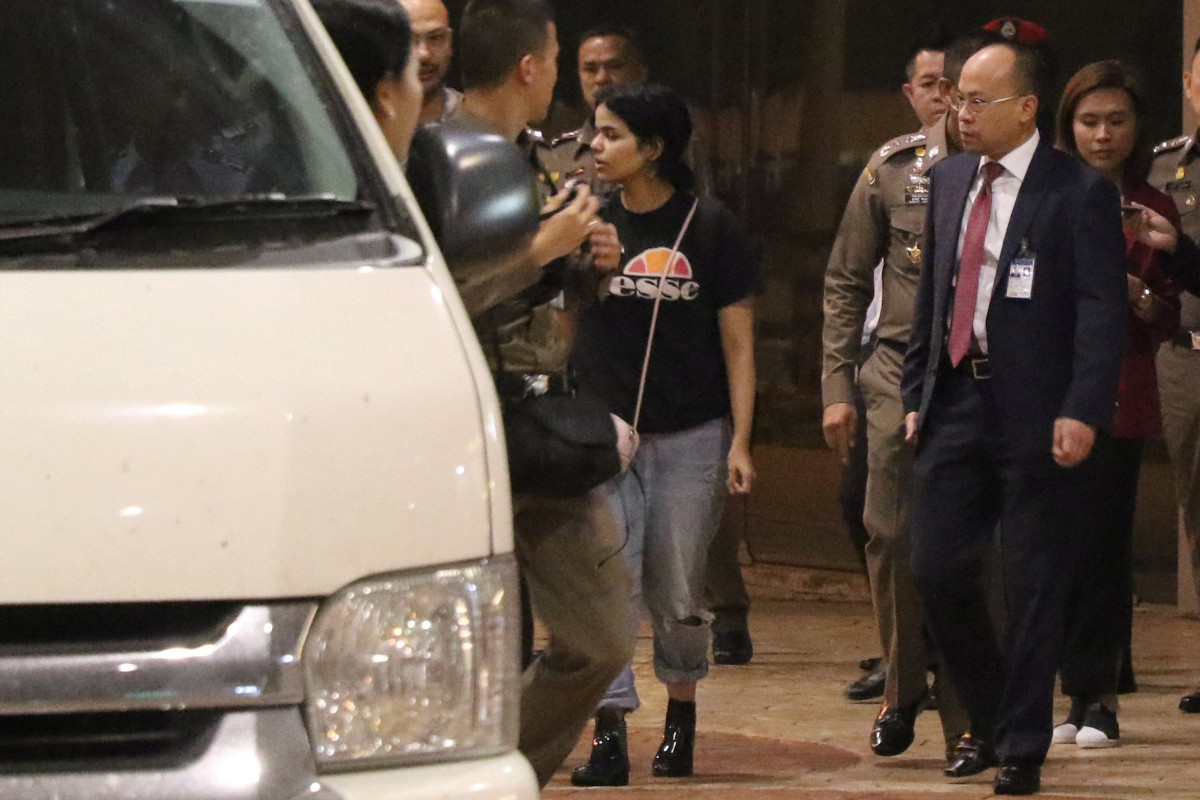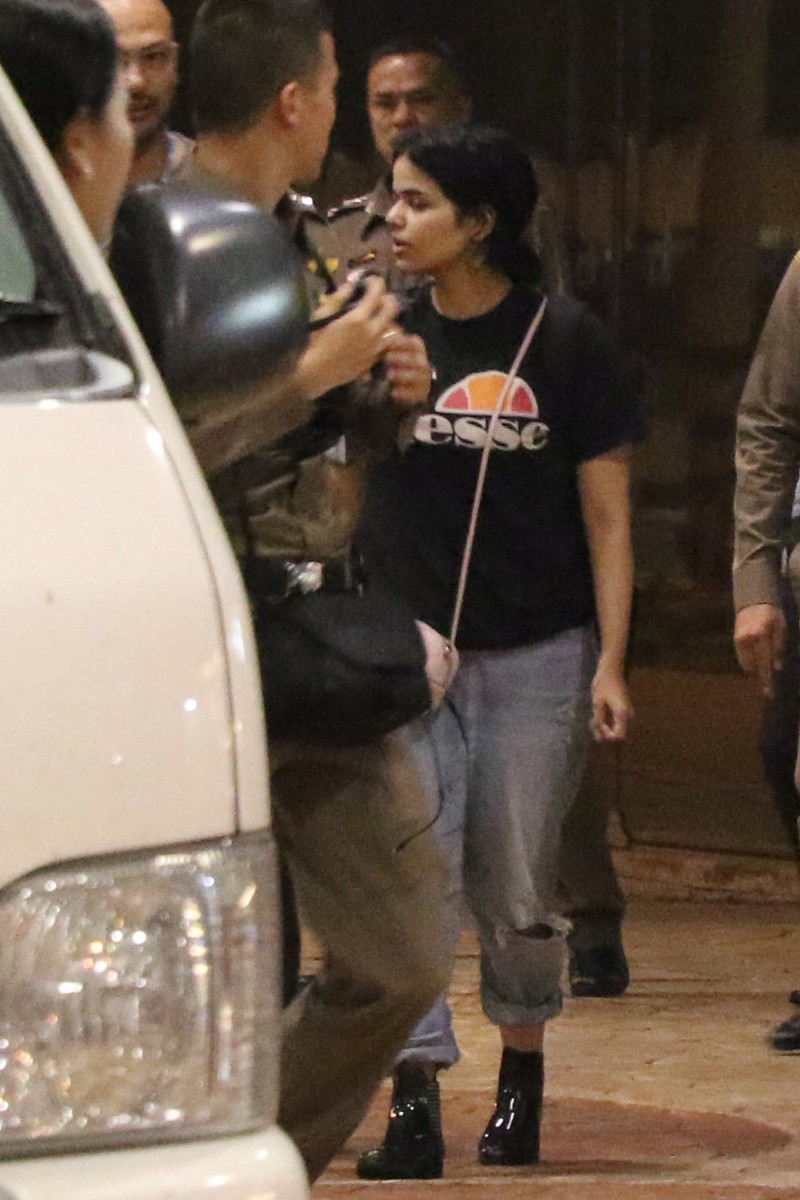 Rahaf al-Qunun walks out of Thailand's Suvarnabhumi Airport in Bangkok, accompanied by UNHCR member and Thai immigration officials.
Rahaf al-Qunun walks out of Thailand's Suvarnabhumi Airport in Bangkok, accompanied by UNHCR member and Thai immigration officials.[UPDATED: Wednesday, January 9 - 2.07pm]
The United Nations has found that Rahaf Mohammed al-Qunun, who fled Saudi Arabia to Thailand, is a legitimate refugee and has asked Australia to take her in, officials in Canberra said Wednesday.
“The UNHCR has referred Ms Rahaf Mohammed Al-Qunun to Australia for consideration for refugee resettlement,” the Department of Home Affairs said in a statement.
[UPDATED: Tuesday, January 8 - 5.00pm]
The father of the18-year-old Saudi woman asylum seeker, who said she feared her family would kill her, has arrived in Bangkok and wished to meet his daughter, Thailand’s immigration chief said on Tuesday. But Rahaf Mohammed al-Qunun’s father and brother would have to wait and see whether the UN refugee agency would allow them to see her, immigration chief Surachate Hakpan said.
“The father and brother want to go and talk to Rahaf but the UN will need to approve such talk,” Surachate told reporters.
The U.N. refugee agency on Tuesday said it was investigating Qunun’s case after she fled to Thailand saying she feared her family would kill her if she were sent back to Saudi Arabia.
Activists are concerned about what Saudi Arabia will do after Thai authorities reversed a decision to expel her and allowed Qunun to enter the country under the care of the UNHCR.
“The father is now here in Thailand and that’s a source of concern,” Phil Robertson, Human Rights Watch’s deputy director for Asia, told Reuters. “We have no idea what he is going to do ... whether he will try to find out where she is and go harass her. We don’t know whether he is going to try to get the embassy to do that.”
Lawmakers and activists in Australia and Britain urged their governments to grant asylum to Qunun, who was finally allowed by Thailand to enter the country late on Monday, after nearly 48 hours stranded at Bangkok airport under threat of being expelled. She is staying in a Bangkok hotel while the UNHCR processes her application for refugee status, before she can seek asylum in a third country.
UNHCR staff were interviewing her on Tuesday after meeting her the day before. “It could take several days to process the case and determine next steps,” UNHCR’s Thailand representative Giuseppe de Vincentiis said in a statement.
“We are very grateful that the Thai authorities did not send back (Qunun) against her will and are extending protection to her,” he said.
A Saudi teen who fled her family in fear for her life was admitted into Thailand last night while the United Nations’ refugee agency assesses her asylum claim.
Rahaf Mohammed al-Qunun, 18, will be taken to a safe location in Bangkok, a hotel where UN staff members will interview her and process her status in coming days. She originally was set to be deported back to Kuwait, where her family was waiting for her. Her family had been on holiday in Kuwait when Rahaf gave them the slip, hoping to get to Australia, where she has a tourist visa.
On Monday night, after she had left the airport, Rahaf tweeted that she had heard that her father just arrived in Thailand, and that it “worried and scared her”.
“I want to go to another country that I seek asylum,” she wrote. “But at least I feel [safe] now under UNHCR protection with the agreement of Thailand authorities. And I finally got my passport back.”
Who is Rahaf Mohammed Alqunun?
Being able to stay in Bangkok is a victory for Rahaf and her friends and activists who began a social media campaign in recent days to save her from being forcibly sent back to her family in Saudi. Rahaf says her family will kill her - literally. stave off her seemingly imminent forcible deportation, despite her pleas that she would be killed if she were to return.
Thai authorities had detained her at an airport hotel in Bangkok’s Suvarnabhumi Airport since Saturday night and had initially planned to send her back to Kuwait on a flight departing yesterday morning. Rahaf, however, barricaded herself in her room and demanded a meeting with the UN refugee agency. She missed the flight.
Hours later, agency officials were granted access to her “to assess her need for international refugee protection and find an immediate solution for her situation,” according to an emailed statement from Caroline Gluck, a spokeswoman for the UN High Commissioner for Refugees. Immigration officials released photos of her leaving the small hotel room in the airport’s transit area where she was being held, escorted by UN officials and Thai authorities.
Surachate Hakparn, head of Thailand’s immigration bureau, said Monday evening that Thailand initially had to detain her as she arrived with “no return destination and no money.” But, he added, when authorities “knew she had some trouble . . . Thailand welcomed her with open arms.”
“If deporting her would result in her death, we definitely wouldn’t want to do that,” he said earlier that day. Thailand has handed her over to the UN Refugee Agency, he added, which will process her claim for refugee status in about five days. She would like to be sent to a third country, Surachate added. Authorities have returned her passport.
Rahaf’s father was due to arrive in Thailand last night. Thai authorities said she can decide whether she wants to see him, and whether she will return with him.
Surachate said that Thai immigration officials would talk to Saudi diplomats today in Bangkok, to explain their procedures and why they did not deport her.
Rahaf began a social media campaign late Saturday on Twitter chronicling her detention and even posting a photocopy of her passport to prove her identity. The young woman, who is from the city of Hail, in northwestern Saudi Arabia, suffered physical and psychological abuse at the hands of family members, including her brother, according to a 19-year old woman who said she and Rahaf have been friends for several years.
The woman said Rahaf’s family locked her up for months at one point as punishment for cutting her hair.
The woman, who lives in Sweden and spoke on the condition of anonymity, said she also fled Saudi Arabia two years ago because her family was abusing her. Rahaf was in contact as she planned her escape, the woman said.
“Her friends believe her life is in danger. We don’t know what the Saudi Embassy will do. We hope that the embassy from another country can help her,” the woman said.
Yesterday morning, hours before her scheduled deportation, Rahaf posted several videos of herself formally requesting asylum and stating that she will not leave her room without a meeting with a UNHCR representative.
“She’s desperately fearful of her family, including her father who is a senior government official, and given Saudi Arabia’s long track record of looking the other way in so-called honour violence incidents, her worry that she could be killed if returned cannot be ignored,” said Phil Robertson, deputy Asia director for Human Rights Watch, who was in touch with her.
Gluck, the UNHCR spokeswoman, said the agency would not comment on the outcome of its meeting with Rahaf “for reasons of confidentiality and protection”.
“UNHCR consistently advocates that refugees and asylum seekers - having been confirmed or claimed to be in need of international protection - cannot be returned to their countries of origin according to the principle of non-refoulement. Non-refoulement is an international principle that prevents states from expelling or returning persons to a territory where their life or freedom would be threatened,” she said.
Surachate, head of the immigration bureau, told reporters on Sunday that Rahaf tried to enter Thailand but did not have the appropriate documents to get a visa on arrival, and so had to be repatriated. Rahaf, however, said she never tried to enter Thailand. She said her passport was taken from her as soon as she landed.
Thailand is not a signatory to the 1951 Refugees Convention but does host a large number of refugees. It has signed on to international human rights treaties that bar it from deporting people to places where they are at serious risk of harm and abuse.
In a statement posted on the Twitter page of the Saudi Ministry of Foreign Affairs, the Saudi Embassy in Bangkok said Rahaf was stopped by authorities in Thailand for “violating the laws” and that the embassy has been in “constant contact” with her family.
Those who were not saved
The dramatic scenes and Rahaf’s pleas for help echoed those of other women who have tried to flee abusive or restrictive conditions in Saudi Arabia. In 2017, Dina Lasloom, a 24-year-old Saudi woman, was similarly attempting to seek asylum in Australia when she was stopped at an airport in Manila. She was forced to return to Saudi Arabia and has not been publicly heard from since.
In Saudi Arabia, women need a male relative’s approval to leave the country - restrictions that last from birth until death. Rahaf could face criminal charges in Saudi Arabia for “parental disobedience” and for harming the reputation of Saudi Arabia by publicly appealing for help. Human Rights Watch in a statement pointed out that this system of guardianship makes it extremely difficult for victims of violence to seek protection or legal recourse for domestic abuse.
Thailand recently detained Hakeem al-Araibi, 25, a former soccer player from Bahrain who had been granted refugee status in Australia after speaking out against a Bahraini official. He was detained November 27 after arriving in Bangkok for his honeymoon. He remains in custody as he awaits a court decision on Bahrain’s extradition request.
